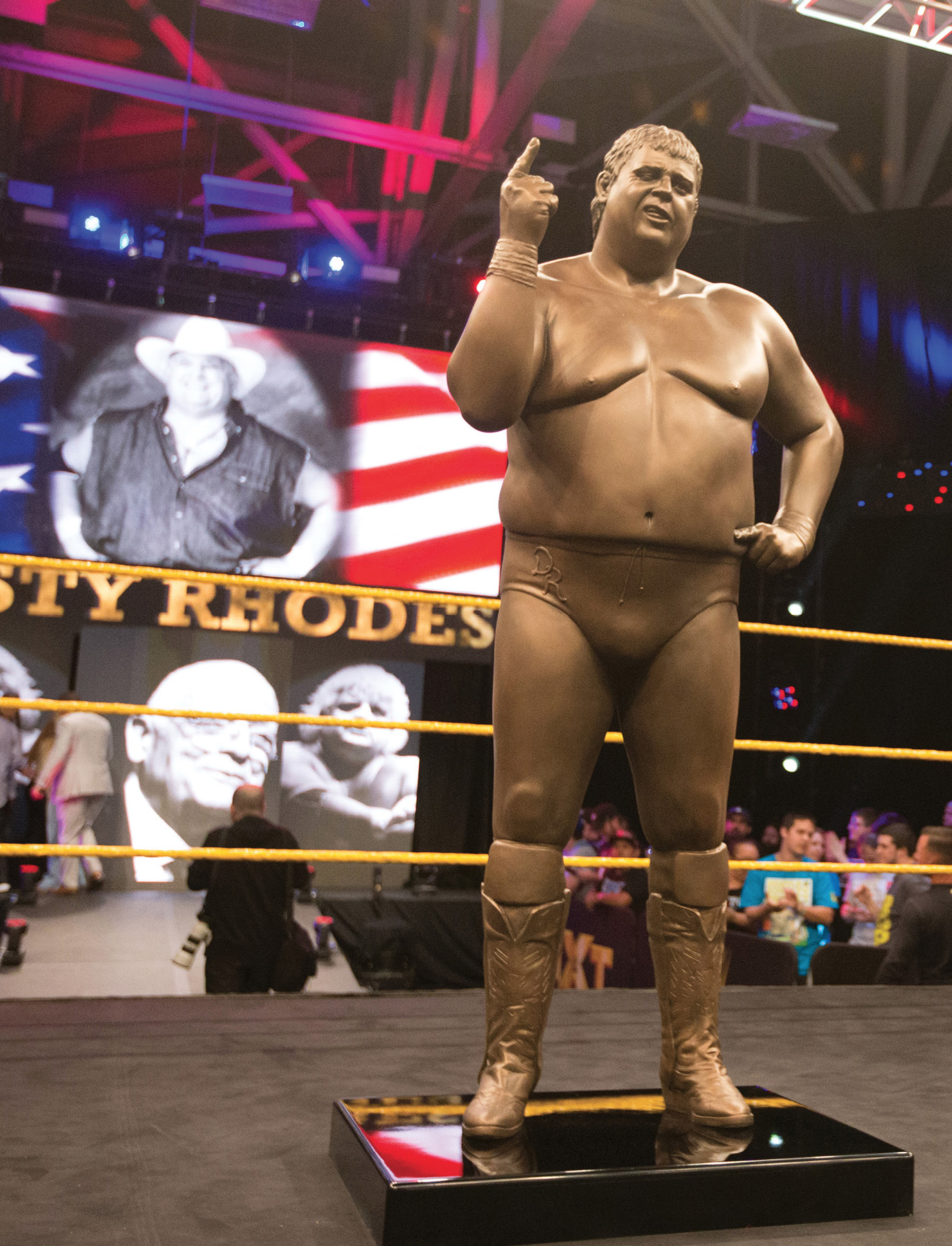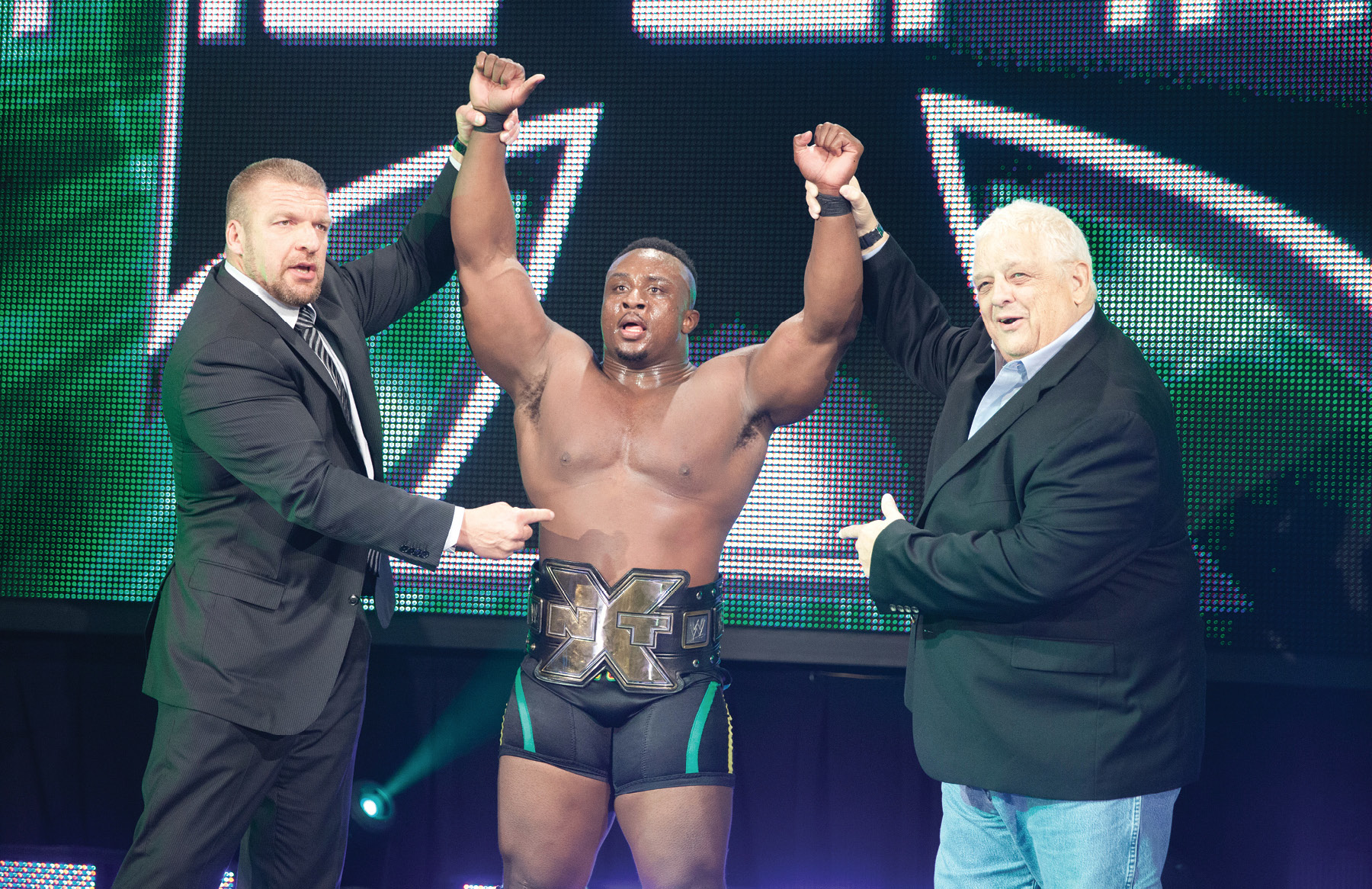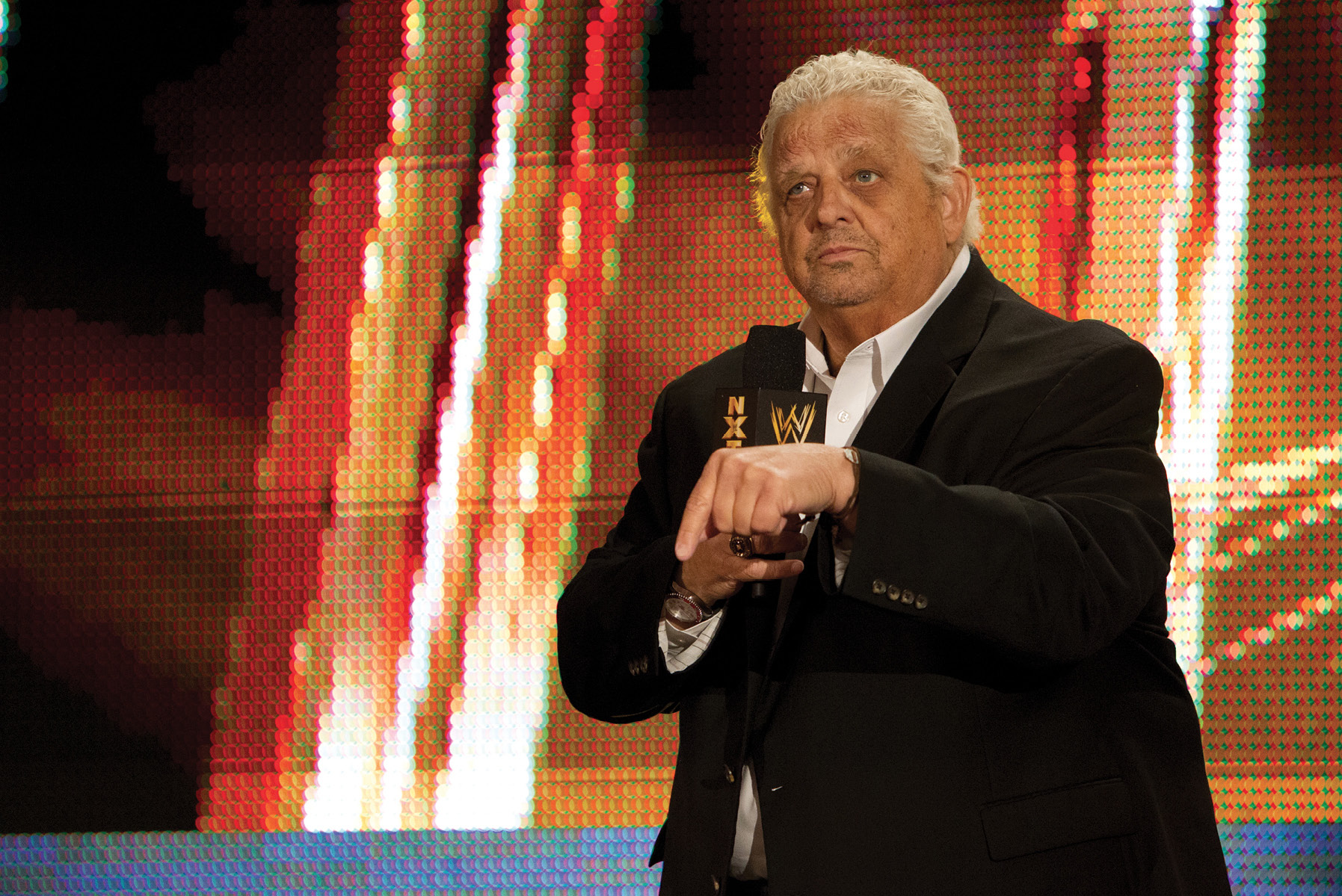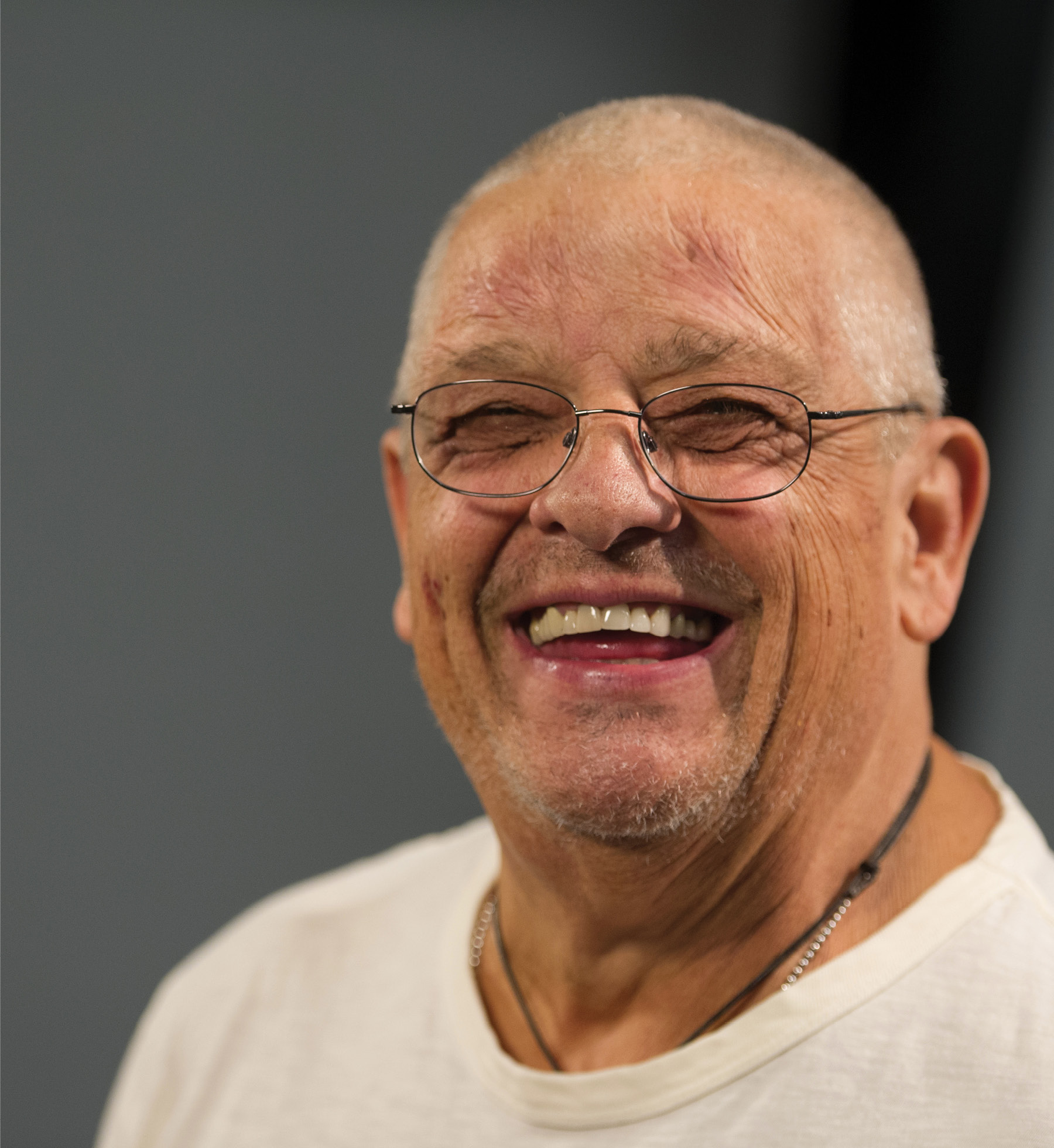CHAPTER 17
The American Dream
On June 11, 2015, Dusty Rhodes passed away at the age of 69. In charge of promo class, he was the most beloved coach at the Performance Center and helped shape the careers and characters of everyone from Bray Wyatt to Seth Rollins. At the same time, he was known as a father figure to everyone in the building, especially the young development talent who were hundreds, sometimes thousands, of miles away from family.
“People ask me all the time, ‘How are you going to replace Dusty?’” says Paul Levesque. “But honestly, you can’t. He was more than a coach; he was a presence. Dusty’s influence on these kids, on this place, and on everything we do can’t be measured.”
“When it came to promos, he’s the best in the world,” says Sasha Banks. “He would sit with me when I would get so frustrated, and he always believed in me, especially when I didn’t believe in myself. He would pull me aside and be like, ‘Sasha, don’t you worry, you’re going to be a star.’ He never let me give up and he helped me so much.”

“I was very fortunate to be able to work with ‘The American Dream’ Dusty Rhodes for a year before he passed,” says Finn Bálor. “I learned a lot from that man. When I first joined NXT, I wasn’t the most confident person to ever cut a promo. He told me, ‘Finn, before you came here, I didn’t know who you were, but by the way people talked about you, I thought Lou Thesz was about to walk through the door. You need to bring your promo skills and your interview skills up to par with your wrestling skills. You have to be the total package if you’re going to make it.’ I learned so much from him about being myself out there. I’m not trying to change my voice or change my accent or anything like that. You can never fail if you’re yourself. That comes straight from Dusty, and that’s the way I’ve been doing it.”
“You couldn’t help but love him,” adds Seth Rollins. “His contributions to our industry are legendary and limitless. You couldn’t list them; it’s impossible. I knew Dusty and worked with him for a few years in FCW, and he was a huge influence on me. He helped me progress a great deal as a performer, especially with a microphone in my hand. Now I’m constantly being given these monologues on Raw, which would not have been possible five years ago, before I met Dusty. He really gave me the confidence and the ability and the little tips and tricks along the way that helped me get to where I am—I owe a lot of that to him. He was also just a great friend and mentor—a guy you could have conversations with. He was great to pass the time with because he always had something to talk about. He was so passionate about people and life. He loved his family and he loved people and he loved living. It was just an incredible honor to know him, to work with him, and to be someone who he believed in. For him to tell me that he loved what I did, that meant the world to me because I grew up loving everything he did: the polka dots and Sapphire, the lisp, and the American Dream. It was very cool to have that rapport with someone you grew up idolizing. He is a soul who will be cherished and missed for a very long time.”
NXT referee Drake Wuertz thinks back to Maria Menounos’s classic interview with Dusty, where she was able to repeat verbatim the timeless Rhodes Hard Times promo back to the legend, and the smile it brought to The American Dream’s face. “There was nothing more genuine than Dusty Rhodes’s smile,” says Wuertz. “I had the opportunity and the blessing to work with him at the Performance Center for a year. A lot of times, the referees would help him with his promo classes, and one night I sat next to him and I asked, ‘Dusty, do you have any guidance or good advice for, you know, somebody here as a referee? I’d just love to pick your brain.’ And he goes—he used to call me Muggs, I guess because of my smile; I’m always mugging and smiling—‘Muggs, when you’re a referee, be the first one on the bus and be ready to ride, baby.’ That’s great. Be the first one, be accounted for. So yeah, I have some good memories of the great year I had with Dusty—just being around him. You know, it still kind of gets me when I walk downstairs to the offices and I don’t see him. He was a one-of-a-kind individual who did so much for our profession and did so much to help so many people.”
Wuertz also remembers Dusty as someone who stood up for the talent in the Performance Center, even when outside influences questioned the validity of certain characters. “Before Enzo Amore was getting ready to debut on NXT television, there was a round table of writers and producers talking about him,” remembers Wuertz. “And they didn’t think that he was quite ready to take that next step—to go out on television. But Dusty Rhodes stepped to the plate and went to bat for Enzo and said, ‘No, the kid’s ready. Send him out there. Let him ride. Let him rock.’ And Enzo went out and knocked it out of the park. The rest is history. All Enzo needed was that one at bat to be able to go out there and prove, not only to the NXT Universe, but also to the writers, producers, and people in the back, that he has what it takes to be something special on our show. Dusty was the one who gave him that chance. I think that speaks really highly of Dusty and of how much he cared about everyone here at NXT. We were his other kids. You know, Cody Rhodes has said it himself, we were his other family, his other kids. That’s really special.”

Triple H and Dusty Rhodes congratulate new NXT Champion Big E Langston.
“Dusty Rhodes was probably the most instrumental person in my career,” adds Amore himself. “Bar none, far and away, he, probably more than anyone else, is the reason I’m still here. I couldn’t even put into words the sadness and the disbelief I felt at his loss. There is an eeriness to coming into the Performance Center and knowing you’re not going to see him. Dusty Rhodes had an aura. He didn’t try, he didn’t put it on, he simply was himself. He taught me about this business, but he taught me even more life lessons. And I think that each and every one of those life lessons translates directly to what you see on screen. He taught me to be myself, and he taught me that if you want to be successful in this business, there’s only one way to do it, and that’s to be real and genuine. I walk through the curtain and I say, ‘Bada Boom! Realest guy in the room.’ That is all Dusty’s doing because Dusty believed in me and what I did while other guys said, ‘Enzo, your style on the mic is too fast . . . people can’t figure out what you’re talking about.’ There is a lot of politics that goes on backstage in any business, and this industry is no different. You’re going to get a lot of advice from people, and sometimes you’re going to get good advice and sometimes you’re going to get bad advice. I never got bad advice from Dusty Rhodes—not once.”
Paige is another performer who felt particularly close to Rhodes.
“I was very close to Dusty—extremely close,” she says. “He kept me sane when I first came here. He took a shine to me straight away, so he took me in and helped me. He loved to help. He was definitely on the talent’s side—he was on our side. He was the voice of reason and our voice when it came to talking to the office. He was always backing us up. Cody Rhodes explained it best: he didn’t like the toys that were already packed up and ready to go. He liked the broken toys that he could fix up himself, polish, and then send on their way.

“The American Dream” has a message for the NXT crowd.
“I remember one day in promo class he said to me, ‘I don’t want you to say very much. You’re this mysterious ribbon-haired lady.’ So I was like, ‘Dusty, I can’t just do a promo every week and not say anything. I have to say something, otherwise people are going to get bored of me.’ One day I was so frustrated and I gave this really bad promo, and he said, ‘I asked you for chicken dinner and you gave me chicken shit.’ I was so mad at him, I said, ‘You’re a motherfucker!’ And I flipped him off and walked away. I went up in the women’s locker room, and five minutes later, I heard a knock on the door and Dusty said, ‘Can I speak to you?’ So we sat on the steps of the Performance Center while everyone was still waiting in the promo class, and he said to me, ‘I just want what’s best for you. I want you to do the best that you can. I know you’re going to be a big star someday, and I know you’re going to make it. Just listen to me and you’ll be on your way.’ And then he said, ‘You’re the first person to ever call me a motherfucker.’ I was like, ‘Sorry, Dusty, you made me mad.’ He was so sweet. He always helped me. He was such an awesome guy.”
“Dusty Rhodes has been NXT’s greatest teacher,” says Charlotte. “It wasn’t the promo room that brought all these characters to life; it was Dusty. The promo room is just somewhere to practice. But it does make a huge difference, and it’s somewhere you need to go every single day if you want to improve. You need to be able to better your craft, but Dusty was such a huge influence when it came to bringing out these characters.”

“The American Dream” Dusty Rhodes, 1945–2015.
Another character Dusty helped influence is Bayley. “He used to call me Bayley-Wayley and I’d call him Dreamie-Weemie,” she says, laughing. “I remember him Tweeting about me when I first got here. He wrote, ‘Bayley’s really good in the ring.’ He didn’t tag me or anything; I just happened to see it and I freaked out. I used to go to him all the time and say, ‘What do you need me to do? How do I better myself?’ Even when I had a character started up, I always felt like I needed more and more, and he would give me little ideas. And I would do it and he would love it, and next thing you know, I’d be doing it on TV. Actually, he was the one who helped me with the ponytail. I came out with a ponytail for my first match as Bayley, and before the match I took it out because I didn’t think that it would be okay to have a ponytail. When I came backstage, he said, ‘Never take your hair out again. Leave it up in the ponytail.’ And now it’s a signature thing, so I can thank him for that as well. He was amazing.”
Canyon Ceman adds, “I love to talk about Dusty. Getting to know him over the last three years has been a great honor. I mean, the man’s a legend. There was the on-screen character Dusty, and there was the guy whose office you’d walk into and who you couldn’t stop talking to because you were so entertained and amused. And sometimes it was like, ‘Oh my God, did you just say that?’ But Dusty’s influence on the Performance Center and on the NXT development system will never go away. I consider him the heart and soul of this building. The day the news came of his passing was a really, really hard day here. Everybody was in shock, and it’s because he touched everyone so deeply—not because he made them a better performer, but because he was a beautiful human. He was just an amazing person who made you feel great when you were in his presence. He was obviously funny, obviously charismatic, but he also cared about you. He was the kind of guy who left you a positive message when he really didn’t need to. The kind of guy who texted you when he heard something that meant he might need to check in on you. He cared about you as a person. I told my parents and my wife when Dusty Rhodes called me ‘Boss.’ It was the day before he died, and that’s a unique privilege in my life. To have earned his respect and enjoyed his amazing personality was one of the best parts of this job. Dusty loved this group of people—the coaches and the talent—and he wanted them to become better performers, but he also helped them become better people. And they will all, myself included, look back on him as influential, not just in their careers, but in their lives.”
